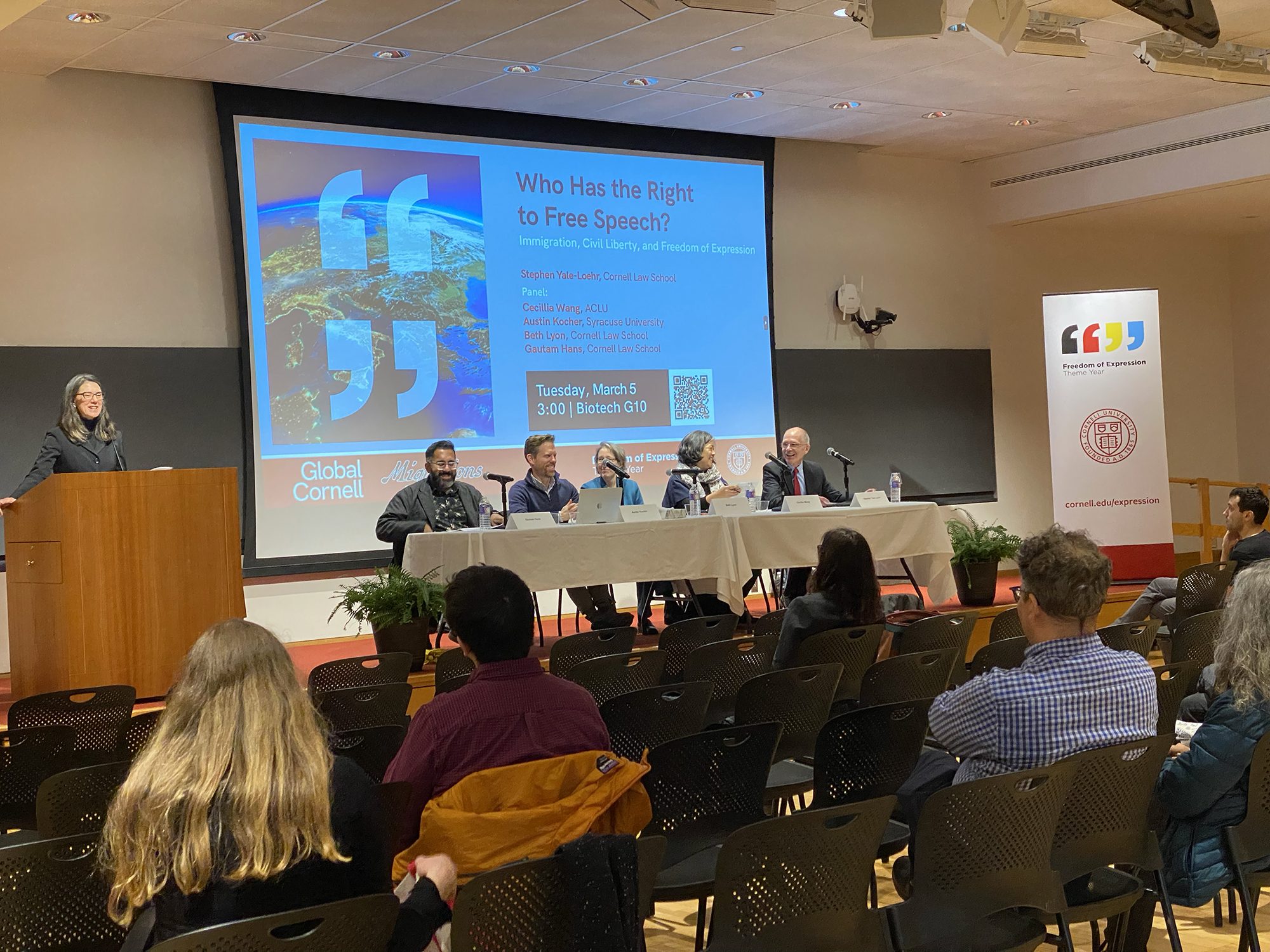This website uses cookies
We use cookies to ensure that we give you the best experience on our website. If you continue to use this site we will assume that you are happy with it.

“The ACLU sometimes represents people whose speech we find vile, because the First Amendment applies to all,” highlighted Cecillia Wang, deputy legal director of the American Civil Liberties Union, at a panel discussion about free expression and the First Amendment in the context of immigration on March 5, 2024, organized by Global Cornell and its Migrations initiative. “The ACLU has an obligation to speak up and fight for rights to be applied fairly and evenly. You can’t apply a standard that discriminates based on viewpoint, because then who decides what speech is okay under the government’s view?”
Guatam Hans, associate clinical professor of law at Cornell, concurred: “I’m the son of immigrants. When I talk with students about First Amendment issues, we ask them, ‘When you represent people you dislike, how would it look if it were the opposite situation? Are you still comfortable with the rule?’ That helps clarify if the rule is justified.”
The panel on the topic “Who Has the Right to Free Speech? Immigration, Civil Liberty, and Freedom of Expression,” was part of Global Cornell’s participation in Cornell University’s campuswide Freedom of Expression theme year. The event, introduced by Vice Provost for International Affairs Wendy Wolford and moderated by Stephen Yale-Loehr, professor of immigration law practice at Cornell, considered how the First Amendment has been interpreted differently for U.S. citizens and noncitizens.
According to Wang, “Theoretically, everyone in the U.S. should have the same equal rights under the First Amendment. In practice, things are different. Noncitizens have been targeted for deportation and detention because of their activism and criticism of the government.”
Austin Kocher, assistant professor at the Transactional Records Access Clearinghouse, a research institute at Syracuse University that uses Freedom of Information Act requests to study U.S. immigration enforcement, asserted that “even though the First Amendment applies to everyone in the U.S., that doesn’t mean that what people say won’t be used against them in immigration cases. People have been arrested by ICE [U.S. Immigration and Customs Enforcement] while driving away from an event at which they spoke and put immediately in detention. We need to consider the risks and harms to immigrants and migrants.”
The panelists also discussed how groups and individuals self-censor for fear of violating a law. For example, there are broad protections for individuals in the United States under the First Amendment, but if the government exempted noncitizens, there would be a chilling effect at rallies. If the police could attend and ask, ‘Who is a citizen?’ that could make noncitizens hesitant to attend rallies.
The panel discussed to what extent governmental social media use and monitoring influence deportations and detentions. Beth Lyon, clinical professor of law and clinical program director, mentioned her research and how “numerous studies show the impact of xenophobic rhetoric and the consequences for immigrants that are not conducive to free speech and expressing yourself. Look at the ICE Instagram page to see pictures of people being deported in handcuffs, showing their names and faces. Why do these images need to be shown? Does ICE need an Instagram account? What rules can our government pass to restrain itself?”
The panel answered audience questions on a variety of themes, including how the regulation of free expression varies in different countries. According to Kocher, “The First Amendment is an incredibly unique American principle. No such provision exists in most other countries. Government limits on free speech might seem nice, but such limits have consequences.”
The panelists concluded by reflecting on how we can improve freedom of expression for everyone, including noncitizens. Lyon argued that “the government should set an example with respectful language about immigration.” Kocher added that “whatever the legal issues are at stake, it’s important to defend and protect the First Amendment.” Wang concurred, affirming that “we have an obligation to speak up and to fight for rights to be applied fairly and evenly.”
Check out Global Cornell’s “Global Free Expression” page for a listing of upcoming Freedom of Expression events.